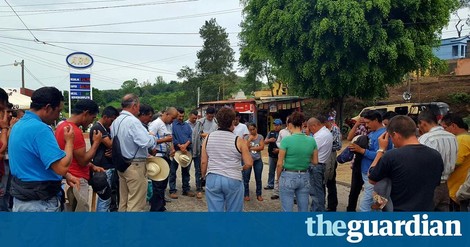Your podcast discovery platform
Curious minds select the most fascinating podcasts from around the world. Discover hand-piqd audio recommendations on your favorite topics.

piqer for: Climate and Environment
Pamela works as a Press & Communications Manager for an international NGO (IWGIA) defending indigenous peoples' rights. She holds an Erasmus Mundus MA in Journalism, Media & Globalisation from Hamburg and Aarhus University and an MA in Political Science from the University of Buenos Aires. She will be putting the eye on international media coverage of indigenous communities and their demands.
Indigenous Peoples Under Siege: Extraction Underground And Murders On Land
Guatemala is one of the most dangerous places to defend land rights around the world. In the south, about 40 miles from Guatemala City, the hunt for profits has moved into silver extraction in the hands of the Canadian company Escobal.
Here lies the third biggest silver deposit in the world, which is not good news for many rural indigenous peoples living traditionally off the land:
“The contrast couldn’t be greater: the mine extracted more than $350m (£270m) worth of silver last year. The protesters, men, women and children turning out for 12-hour vigils, eke out a living by farming coffee, maize and small herds of cattle”.
The extractive activities have already shown the darkest side: since 2010 at least 41 people have been killed — including eight at the Canadian-owned mine.
Extraction is at the top of the agenda: today Guatemala “hosts” at least 307 active mining licences with 600 other projects under consideration, most of them on indigenous land.
Silenced voices against extractive projects
Until today, about two million people have participated in plebiscites since 2010, voting overwhelmingly against environmentally destructive projects such as mines, logging and dams. Their voices have been largely ignored and silenced.
In the eyes of the land activists, the harassment is constant. Facts speak for themselves: seven protesters were shot outside the mine days after the licence was granted.
With a hope for a peaceful resolution, protestors welcomed Guatemala’s supreme court's preliminary suspension of the licence this week. Even though the company has filed an appeal, the argument was solid: lack of consultation with indigenous peoples.
This is insightful reporting from the eyes of those dying to stop the destruction of their lands.
